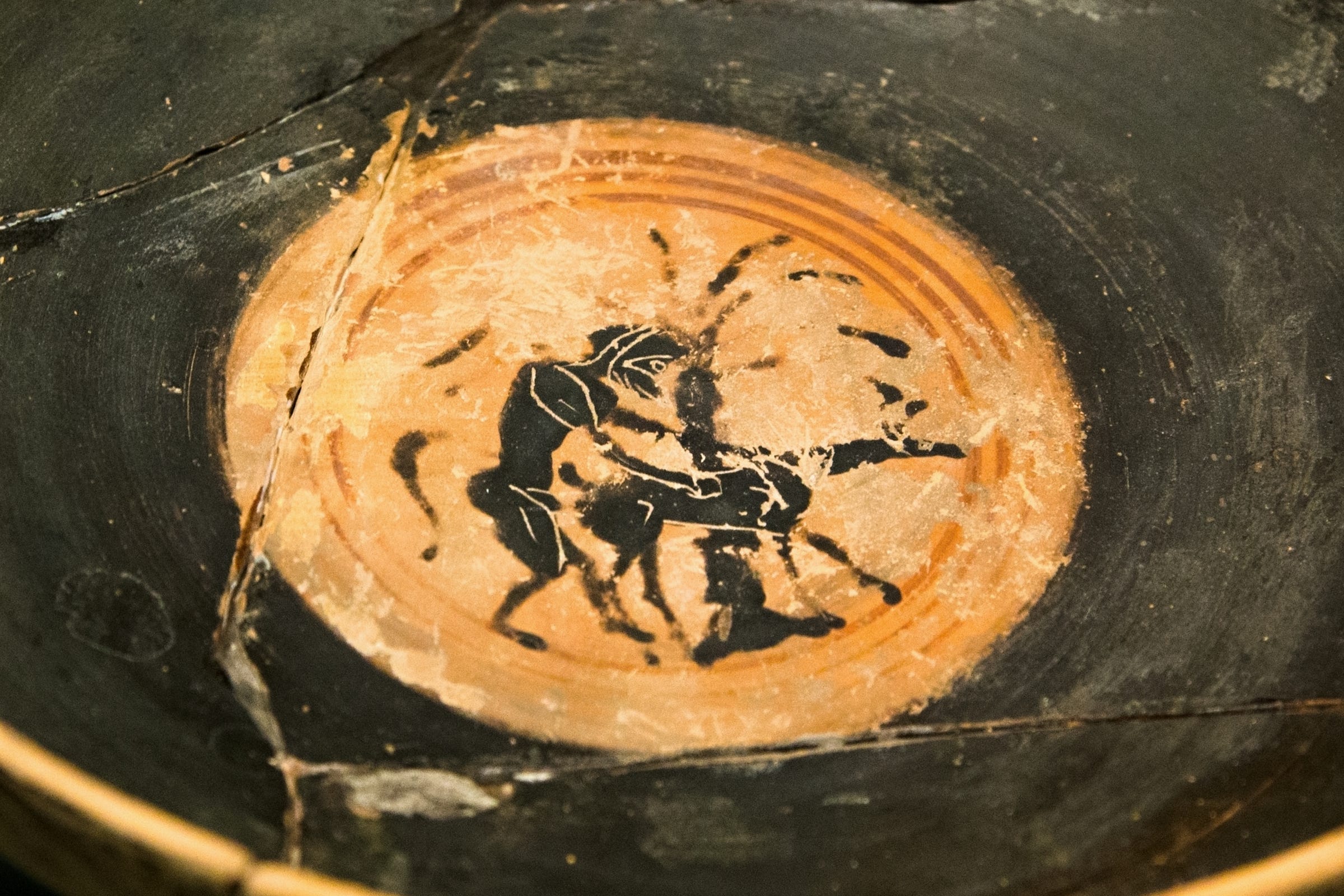Section 5 of "A Defense of Bestiality"
Let’s workshop--for National Interspecies-Sex Month--the fifth section of an essay defending the moral permissibility of bestiality under certain circumstances
Sections 1 and 2 can be found here.
Section 3 can be found here.
Section 4 can be found here.
A Defense of Bestiality
Dedicated to Gary Varner
5. Natural Case Against Bestiality
5.1. Argument
Another popular justification for the immorality of bestiality is that it is “unnatural.” When in the seventeen century Mary Hickes was indicted for bestiality, the charge describes her as in defiance of nature: Mary Hickes, “to the disgrace of all womankind, did commit Buggery with a Mungril Dog . . . and against nature had venereal and Carnal copulation with him.”[i] Or take the case of John Cole, the charge against him being that he “committed an unnatural crime,” having “against the order of nature attempt[ed] carnally to know a certain female dog.”[ii] Looking at the US legal codes, we see similar language. North Carolina, for example, calls bestiality a “crime against nature” and Maryland calls it an “unnatural or perverted sexual practice.”[iii]
The core meaning of “unnatural” in discussions of bestiality has traditionally been that it runs contrary to the reproductive purpose of sex. Aquinas, one of the giants in the history of philosophy from which this language has branched out across the globe, says that the affront to the natural order posed by bestiality makes it—along with homosexuality and masturbation—a moral transgression worse than heterosexual rape and heterosexual adultery (since at least these can be procreative).[iv] However much we use the Aquinian language today, though, a growing number of us have other things in mind when we call bestiality “unnatural.” North Carolina and Maryland, in particular, must mean something different. After all, numerous nonprocreative sexual practices (like masturbation and homosexuality) are not illegal there. Or think of all the people just a century ago who shook their heads in disgust over the dinner table at how unnatural miscegenation is. Surely they did not mean that it cannot result in babies—or, more in their language: “tar-brushed abominations.”
Let us look, then, at the various options as to the meaning of “unnatural” in this context. Here are the most common, several of which overlap in my effort to be exhaustive.
(1) Interspecies sex is a lifestyle choice rather than an evolutionary drive.
(2) Interspecies sex is unusual, a deviation from instinctual norms.
(3) Interspecies sex transgresses ingrained traditions and values.
(4) Interspecies sex reflects a neuroatypical—indeed, a deeply-distorted—mindset.
(5) Interspecies sex is not practiced among animals.
(6) Interspecies sex violates the procreative purpose of sexual organs.
(7) Interspecies sex is revolting—a fact that clues us in, like the urge to puke when we see someone eating poop, to its being a perversion for which nature stands ready to dish out payback (think: kuru in the case of cannibalism).
(8) Interspecies sex lacks any instrumental purpose or practical function.[v]
We can summarize these considerations in the following argument.
1. If bestiality is unnatural, then bestiality is morally impermissible.
2. Bestiality is unnatural.
Therefore, bestiality is morally impermissible.
5.2. Response
Premise 1 faces a serious problem. Any freshmen a few weeks into their ethics course would spot it: just because something is unnatural (whatever that might mean), that does not entail that it is wrong. Surely using an electric toothbrush is unnatural (if anything is, which is something I doubt).[vi]And what about scrolling TikTok or flying in a plane or taking synthetic cancer drugs? Just because these activities are “unnatural” does not make them wrong. We value many things often described as unnatural (Nikes, guns, smartphones, cyberspace, governments) just as we regard as evil many things often described as natural (illness, war, earthquakes, rape, death). As I said in section 3, it is important to remember that we are dealing with humans here: so mentally stunted by the desire to have it their way that it is not uncommon to find them citing merely the unnaturalness of x, y, or z (nuclear power, gender-affirming surgery, cloning) as sufficient for their moral impermissibility even as they sleep with CPAPs in air-conditioned homes after their heart transplants.
The problem with premise 1, in short, is that it is fallacious to deduce a moral-ought merely from a nonmoral-is. But even if I grant the legitimacy of deriving a moral-ought merely from a nonmoral-is, the ought we would presumably get here would not seem favorable to the opponent of bestiality anyway. Think about it. Interspecies sex is merely relatively rare in nature rather than nonexistent, manifesting across the animal kingdom as well as in every region and time of human history.[vii] Using the logic of the is-ought fallacy, then, from this nonmoral fact we can derive the following moral fact concerning bestiality: bestiality should be practiced, but only relatively rarely. That conclusion is fine enough for my purposes here.
These points suffice to dispense with the line of reasoning at hand. In case there is need of more convincing, however, let me respond to each of the various meanings of “unnatural” when one says bestiality is unnatural.
(1) Whether something is an innate disposition or a lifestyle choice has no bearing on whether it is morally permissible. Just because some people are born to be violent, that does not make their displays of violence morally permissible. And just because some people choose to cultivate a pacifist character (even to the extent of going against their inborn disposition), that does not make their refusal to engage in violence morally impermissible. It is true that interspecies sex has not been selected for by evolution. After all, it rarely can result in pregnancy. And even when pregnancies do occur, they are more likely—as we see with tigons and ligers—to suffer from health issues. But, of course, homosexuality too—according to the same standards at least—has not been selected for by evolution. That does not make the practice immoral.
(2) Most people do not play the yabajar. But surely that itself is no mark against its permissibility. Deviant forms of sexual behavior (like polyamory or homosexuality) are not rendered immoral merely on grounds that they are unusual. The same goes for bestiality, which has been taking place—not even counting our sexual activity with Neanderthals and Denisovans—for as long as humans have been in close contact with animals: an unbroken chain from the dawn of the human race until today.[viii]
(3) Although bestiality violates norms and traditions and shared values (of at least our culture), and although violators of norms and traditions and shared values are likely to be ostracized and afflicted with great mental distress, that does not mean bestiality is immoral. It is not immoral for a girl to veer from traditional gender expectations by playing baseball with boys and by refusing to wear dresses. Nor is it immoral for a rich man to give most of his wealth to a stranger instead of to his family. Abolitionists faced ostracism for opposing slavery. That did not make their mission immoral. Homosexuals faced alienation from their own families for engaging in same-sex romance. That did not make such romance wrong.
(4) It seems odd to say that a person who lets an animal do sexual things to him as part of its own uncoerced desire, a person who also makes it a point to protect the welfare of the animal at all times, is mentally deranged. Especially considering unproblematic cases of bestiality (as in Cases 7-9), saying that bestiality is a mental illness sounds uncomfortably close to saying that homosexuality is a mental illness (as it was until the mid 1970s). Besides, there are many practices of the mentally ill that we regard as morally permissible, anyway (like washing one’s hands a hundred times a day). The mental illness charge is only a rhetorical flourish, irrelevant to the issue. And for whatever it might be worth to say at this point, not everyone who engages in bestiality is acting out of some warped sexual orientation or entrenched fetish. Just as some men engage in sex with other men in jail as a stopgap until women became available, some people engage in bestiality due to lacking options (for a variety of reasons).[ix] I do not want to perpetuate an unfortunate stereotype, though. Just as it was not true (despite the old stereotype prior to the gay-rights revolution) that women only have sex with women because they are somehow unwanted by men, it is not true that people only have sex with animals because they are ugly or lacking in features a human mate would find desirable. Some engage in sexual contact with animals as a way to rid themselves of venereal diseases, or to grow their penises, or to increase their sexual prowess, or to practice before marriage, or to commemorate their first hunting kill, or to push boundaries and experiment. Some find animals better partners. Some find sexual contact with animals a holy aspect of religious ritual.[x] Think of the goat sex involved in the ancient Greek worship of Pan. Or take a less-familiar contemporary case: that of the Matang tribe, where men have sex with cows—the sacred symbol of life and motherhood in Hindu culture—as part of the devotional ritual worship of Kamakhya, a goddess of fertility.
(5) Despite Kant’s claim that no animal ever turns to sexual activity beyond the species divide (an assumption from which he derives the conclusion that to practice bestiality is to degrade oneself even lower than that of animals),[xi] interspecies sex—even if comparatively rare—is practiced widely across the animal kingdom. Bonobos, our closest relatives, engage in sex with other primates as well as turtles and birds. Dolphins engage in sexual activity with various aquatic animals—and are known for trying to mate with humans. Then there are dogs, ducks, fruit flies, beetles, tortoises. The list goes on. The pet cat humping the pet rabbit; the billy goat horny enough force itself into any hole—sexual contact between species has been taking place as long as different sexual species have lived in proximity to one another.[xii] But all that is no matter. Even if no other creature engages in interspecies sex, that would have no relevance to whether bestiality is morally permissible. No other creature builds airplanes or bakes cookies or plays basketball or takes out a second mortgage on their home for invitro fertilization. None of that entails that these activities are immoral.
(6) It could be said that licking stamps violates the original purpose of the tongue. But that does not make it wrong to do so. And consider some additional points.
(a) We do not say homosexual behavior or anal sex or fellatio is wrong just because it cannot result in babies. And for those like Aquinas and Kant (and a long line of others) who say it is wrong for precisely that reason, many of them I imagine do not find it wrong to have sex with their wives after menopause or after a full hysterectomy.[xiii]
(b) It is logically possible for there to be a species with which humans could mate. That logical possibility, in fact, motivated Mengele to force dogs and Jewish girls to copulate in an attempt to create the perfect slave laborer. Breeding between different species is rare, yes. The genetic difference is often too extreme for fertilization to occur. There are exceptions, however: ligers, for example. Some might say, although I would be uncomfortable agreeing, that interbreeding between humans and Denisovans was an actual case. But the actuality is no matter. The logical possibility of hybridism is all that counts for the specific objection at hand.
(7) People—well, some—find it revolting to clean toilets and to handle tarantulas. And many people found miscegenation, long deemed “unnatural” too, as puke-worthy as I find engaging in scat-sex with a pig. But that does not make such behaviors wrong. We should also be careful about talk of nature “dishing out payback” to people who have sexual relations with animals, or to people who eat other people, or to people who eat feces. Diseases have spread in all these cases, yes. But human susceptibility to these diseases is not locked in place regardless as to how evolution unfolds. Many people are resistant to kuru, for example. And the culling hand of evolution selects such people as fittest (all other things being equal) in those environments so starved of protein that humans look tasty. It should be noted, in addition, that nature also equips humans with a high-powered brain to work around susceptibilities we do have, as I discuss in the section on zoonotic diseases (section 7). In the kuru case at hand, the humans can simply avoid eating the brain flesh of their fellow humans.
(8) To condemn bestiality as wrong because it serves no instrumental purpose is unreasonable when we consider that someone might masturbate their dog out of an empathy-oriented purpose of relieving the animal’s frustration. And what about the dolphin in Case 9? Surely she finds her behavior useful to some specific end: getting off and, so we can imagine, bonding too. The swimmer as well finds his part in the interaction useful to some specific end: getting the dolphin off, seeing what will happen, bonding. Especially if the swimmer loves the dolphin and is, say, more turned on by the exoticness of the encounter than he would be either masturbating or being with another human, the interaction serves an emotional and physical purpose. It helps foster a relationship. One might say that it is ridiculous to assume that a connection is being had here. But there are cases where dolphins—who do have rich emotional lives—get bonded to specific swimmers, even waiting for them to drive up to the dock. To say that we do not know if this is real (despite the repeated sexual play and waiting and cuddling) is to set the bar high enough that we could voice the same skepticism about human-to-human interactions. And what would that matter anyway, especially given our hookup-culture where it is popular to have unemotional sex? Such a world might not be preferable, but we do not say it is immoral for people to hook up. Deep connection is not a requirement of morally kosher sexual interaction.
5.3. Conclusion
Merely citing the supposed unnaturalness of bestiality is insufficient to establish its moral impermissibility. More relevant reasons would be needed even if bestiality were unnatural (which it is not). To make the point in the same terms I used against the other anti-bestiality arguments explored so far, kicking infants in the head for the fun of it is wrong, if it really is wrong, not at root because it is unnatural, but rather because of facts that have direct bearing on the issue—facts such as, for example, that the infant and its loved ones would experience unnecessary pain. The opponent of bestiality, therefore, needs to disclose what these facts are in the case of bestiality.
Notes
[i] Thomas 2011, 164.
[ii] Carr 2016, 420-421
[iii] See Holoyda 2022.
[iv] See Soble 2003, section 3. Aquinas held that bestiality, by the way, was the most sinful of the four main types of unnatural vices: bestiality, homosexuality, non-missionary sex, and masturbation. This provides an interesting contrast to some Muslim cultures that put bestiality lower on this list if not off the list completely—a point reflected in the longstanding practice in Arab cultures of encouraging boys to have sex with goats and sheep and camels and donkeys instead of reducing oneself to masturbation as well as perhaps in the popular Arab saying: “The pilgrimage to Mecca is not complete without copulating with the camel” (Masters 1966; see Miletski 2005).
[v] See Balderi n.d.
[vi] Personally, I hold that everything is natural. Everything is ultimately a function of what is given by nature (there are, that is, no contributions that come ultimately from beyond nature that influence how nature unfolds), in which case even nuclear reactors are as natural as beaver dams (see Istvan 2021a).
[vii] See Miletski 2005; Masters 1966; Maratea 2011, 925; Salisbury 1994, 84; Beetz 2004, 2-5.
[viii] See Maratea 2011, 925; Salisbury 1994, 84; Miletski 2005; Masters 1966; Beetz 2004, 2-5; Singer 2001. Human–animal sexual activity is practiced across cultures and is not restricted to certain genders or sexual orientations or ethnicities or geographical regions (see Navarro and Tewksbury 2015, 873). It has not been rare in the Western world over the past few hundred years, especially among rural people in communities where marriage is put off until after the high-hormonal period of sexual curiosity (see Thomas 2011, 149-150). Whereas according to the Kinsey studies only eight percent of males (and close to four percent of females) report sexual relations with animals (cows and calves especially), close to fifty percent of rural males reported such contact (Kinsey 1953)—a number that, on the one hand, has gone down as rural populations have declined (Miletski 2005) but, on the other hand, is likely higher than revealed in studies given the fact that people, fearing stigmatization and prosecution, tend not to be forthcoming about their sexual actions with animals (Maratea 2011, 926).
[ix] Let us consider, for example, rural youths of a few centuries back in communities where (a) marriage is put off until later in life and where (b) masturbation is highly condemned. Prior to taking a wife, and while in the highly hormonal throes of youth, it is easy to imagine these boys feeling less inhibition about partaking, if only once or twice, in the sex they see animals engaging in each day.
[x] See Navarro and Tewksbury 2015, 870.
[xi] Kant uses the same reasoning to conclude that homosexuality and masturbation brings humans to a level even lower than that of animals (see Soble 2003, section 3).
[xii] See Salisbury 1994, 84. Just the other day I opened TikTok, for example, and saw a dog getting a blowjob from a suckling calf.
[xiii] See Soble 2003, section 3.







